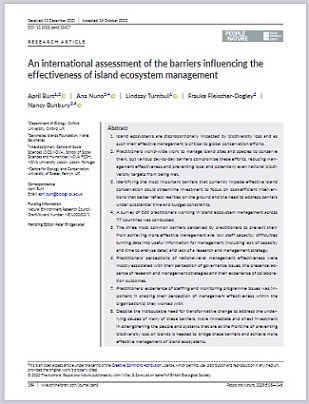
Island ecosystems are disproportionally impacted by biodiversity loss and as such their effective management is critical to global conservation efforts. Practitioners worldwide work to manage island sites and species to conserve them, but various day-to-day barriers compromise these efforts, reducing management effectiveness and preventing local and potentially even national biodiversity targets from being met. Identifying the most important barriers that currently impede effective island conservation could streamline investment to focus on cost-efficient interventions that better reflect realities on the ground and the need to address barriers under substantial time and budget constraints. A survey of 360 practitioners working in island ecosystem management across 77 countries was conducted. The three most common barriers perceived by practitioners to prevent them from achieving more effective management are: low staff capacity; difficulties turning data into useful information for management (including lack of capacity and time to analyse data); and lack of a research and management strategy.














